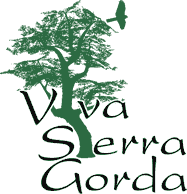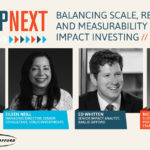 A Mexican people’s movement in an arid rural area is about to come to market with some of the highest priced and heavily validated carbon and ecosystem services on the planet.
A Mexican people’s movement in an arid rural area is about to come to market with some of the highest priced and heavily validated carbon and ecosystem services on the planet.
Because it creates a unique mix of social and environmental value, the Sierra Gorda Biosphere Reserve’s luxury niche carbon offset has a hard time telling its story to donors who are often focused principally either on the planet or on the people, but less often both.
That’s not to say that Sierra Gorda (SGBR) has not been recognized; they are a Schwab Foundation awardee, an Earth Island grantee, and recipient of honors from the UN, the Mexican government, and foundations going back 15 years.
Reputable groups such as Oliver Karius’ Lichtenstein-based LGT Venture Philanthropy have bought carbon offsets from them.
But the new $20 price per ton on carbon offsets that Sierra Gorda plans to roll out after an expected certification in March by Rainforest Alliance is different. Only one ecotourism group and a couple of European groups are selling carbon offsets near that price. To get that premium, SGBR will have to explain the deep value they create, and in the process, perhaps bridge the gap between planet-focused and people-focused impact funders.
That’s not simple; planet-focused investors and donors typically only look at the impact on the planet, and are only coming to understand sustainable developing world agriculture as an ally in their efforts to save animals and the environment. People and poverty alleviation-focused funders, the core of the SOCAP community for the last three years, mostly look at social impact. Sierra Gorda offers both.
We plan to take a deep look at Sierra Gorda’s unique value at this year’s SOCAP/Europe as a way to span that divide through helping both groups understand the holistic value of the SGBR carbon premium, and what they call SEROI: Social and Environmental Returns on Investment.
Sierra Gorda is hopeful that the UN Foundation, a long-time backer, will be among their first carbon offset customers and will help them explain the social and environmental value of their ecosystem services.
“We are the only group selling carbon and ecosystem services that is made up of poor people who plant trees and clean out creeks,” said Pati Ruiz Corzo, director of SGBR. Corzo is also the remarkable woman who began the effort in an area about the size of Rhode Island, a five-hour drive north of Mexico City.
“We are winning against climate change,” says Laura Perez-Arce, Corzo’s collaborator for the past dozen years. The Kyoto Protocol’s carbon metrics are geared toward large plantations with 500 hectares, whereas the real genius of Sierra Gorda is that it enlists 35,000 local poor people in 638 communities working their on own plots as small as 1/3 of a hectare as well as on public land. The locals work in waste and watershed management on behalf of themselves and their larger community, and, as it turns out, on behalf of their planet. “These other reforestations schemes, they get scientists to build the models. We have been here hundreds of years and will be here in 30 years. Who can say they will be doing that in 30 years in (commercial reforestation)?”
Sierra Gorda is certified by government groups; from the village, to the county, to the state, and to the Mexican nation. And that approach also flies against traditional top-down carbon offset efforts.
Having reclaimed the land, Sierra Gorda is adding sustainable livestock farming that produces high-quality and high-margin cattle while also replenishing the soil using the methodology pioneered by Allan Savory in Southern Africa.
Sierra Gorda has already sold around $5 millions of carbon offsets and ecosystem services to manufacturers, Spanish rental car companies, and governments in the voluntary, philanthropic, non-regulated market. But with an audit putting the actual cost of their carbon at $19.50, their new price captures the true cost and value of what they do. “We want to stop depending on subsidies from our government,” Perez-Arce says. “We want to recover our labor costs, the infrastructure to manage small reforestation on tiny plots.” A 16 percent sales tax currently imposed by the Mexican government keeps them from offering a financial return, but supporters are suggesting there could be a way around that for a group with this unique track record.
A new U.S. based non-profit created by Perez-Arce, Carbon Neutral Planet, is nearly ready to offer services to individuals and groups to reduce their carbon footprint. The group also has more than a dozen ecotourist resort opportunities that it has helped create in its area and more than a dozen up-and-running microenterprises.
“We have a solid model that can be replicated by other poor people in other places,” Corzo said. “We have an attractive story and a mechanism for financing conservation and fighting poverty. We need to hold the line on our price.”
To do that, they will have to get people to view the value of what they are doing from two lenses: impact on the planet and impact on the people. We want to help them at SOCAP/Europe, but we need your help to do it.



